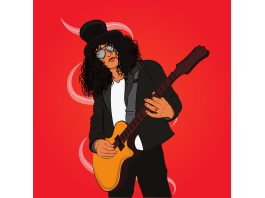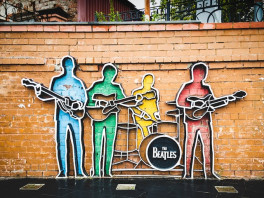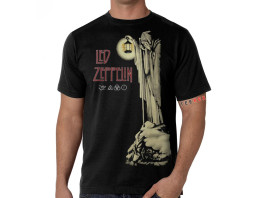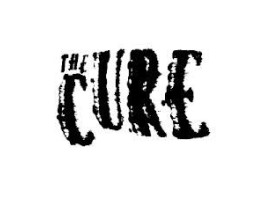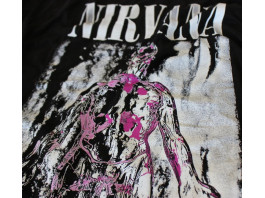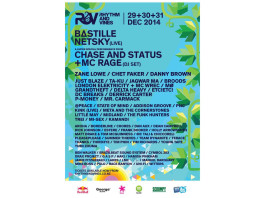
From leather jackets to ripped jeans, rock bands have long been known for their distinct and rebellious sense of style. At the heart of this iconic image, however, lies one accessory that has become a symbol of cool confidence and individuality—the sunglasses. Whether you’re thinking of John Lennon’s round frames, Bono’s oversized tinted lenses, or Slash’s mysterious dark shades, sunglasses have evolved from a mere accessory to a defining feature of the rock image. Not only do they serve as a fashion statement, but they also carry a practical purpose for rock stars constantly under the spotlight, both literally and figuratively.
In this exploration of the rock band industry and the significance of sunglasses, we’ll take a look at how this simple accessory became a staple in rock culture and how modern brands like iPOP Eyewear continue to offer classic rock star styles, from aviators to Wayfarers, at affordable prices.
The Origin of Sunglasses in Rock Culture
Sunglasses weren’t always part of the rock 'n' roll wardrobe. In fact, they didn’t truly enter the music scene until the 1960s. The rise of rock music coincided with the cultural revolution of the time, and musicians began using fashion as a way to challenge norms and express their identity.
The Beatles, particularly John Lennon, played a significant role in popularising sunglasses among musicians. Lennon’s round, wire-frame glasses became synonymous with his persona, blending a sense of mystery and nonchalance. His choice of eyewear wasn’t just a fashion decision; it reflected the counterculture and the spirit of the 1960s. As the decade progressed, other rock legends like Jim Morrison and Mick Jagger followed suit, opting for darker, more edgy styles. The shades became a mask that allowed musicians to hide from the public eye while still exuding an aura of charisma and rebellion.
By the 1970s and 80s, sunglasses were firmly embedded in rock culture. Stars like David Bowie, Elton John, and Joan Jett each adopted their unique styles, pushing the boundaries of how sunglasses could be used as part of a stage persona. Bowie’s colourful, avant-garde sunglasses matched his ever-evolving, flamboyant aesthetic, while Joan Jett’s dark, wrap-around shades added to her tough, no-nonsense rocker image.
The Symbolism of Sunglasses in Rock
What makes sunglasses so appealing to rock stars? The reasons are both practical and symbolic. Practically speaking, rock stars perform under intense lighting, and sunglasses help shield their eyes from the glare of stage lights. In addition, the media attention that comes with fame can be overwhelming, and wearing sunglasses offers a degree of privacy—an attempt to create a barrier between the performer and the public.
However, sunglasses have also taken on a deeper meaning within rock culture. They are a symbol of non-conformity, of rejecting societal expectations. Rock music has always been about rebellion, pushing against the boundaries of what’s considered acceptable or mainstream. Sunglasses, particularly the dark, oversized varieties often worn by musicians, embody this defiance. They allow rock stars to hide their emotions, projecting an air of detachment and aloofness that only adds to their mystique.
Additionally, sunglasses are an excellent way for musicians to cultivate a specific image. Each style of sunglasses can represent something different—aviators suggest a cool, laid-back vibe, while oversized tinted lenses hint at eccentricity and flamboyance. In this way, sunglasses have become a tool for rock stars to craft and maintain their public personas.
The Evolution of Rock Star Sunglasses: Key Styles
As rock music has evolved over the decades, so too have the styles of sunglasses favoured by its stars. Here are some of the most iconic types of sunglasses that have defined the rock image:
Aviators:
Originally designed for pilots, aviators became a rock 'n' roll staple in the 1970s. Stars like Guns n' Roses and Iggy Pop donned aviator sunglasses, further cementing their cool, rebellious image. The thin metal frame and large, tinted lenses create a tough, edgy aesthetic that has endured through the decades. Today, aviators remain a popular choice, with both classic and modern variations available.
Round Sunglasses:
John Lennon’s round wire-frame sunglasses are perhaps the most iconic in rock history. These glasses represent the laid-back, peace-and-love vibe of the 60s counterculture. Artists who lean towards a more bohemian or retro style continue to favour this look, keeping the spirit of the era alive.
Wrap-Around Sunglasses:
Known for their futuristic, sporty design, wrap-around sunglasses became popular in the late 80s and early 90s. Bands like U2 and Red Hot Chili Peppers embraced this trend, particularly frontman Bono, who made wrap-around sunglasses his signature look. Wrap-around sunglasses offer both a functional and stylish option for musicians performing under harsh lights, combining comfort with a bold aesthetic.
Wayfarers:
Made famous by Ray-Ban in the 1950s, Wayfarer sunglasses found their place in rock culture in the 1980s, thanks to bands like The Blues Brothers and later, punk rockers like Green Day. Their thick, angular frames offer a more structured, retro look, perfect for musicians looking to balance cool sophistication with a sense of rebellion.
Sunglasses: An Extension of Rock Star Identity
For many rock stars, sunglasses are not just an accessory, but an extension of their identity. Take Slash from Guns N’ Roses, for instance—his dark, oversized shades are as integral to his image as his top hat and wild hair. Similarly, Kurt Cobain’s white, oversized oval sunglasses became a symbol of the grunge movement, blending irony with fashion. Cobain’s choice to wear those glasses was a statement in itself, rejecting the clean-cut, glamorous image that had dominated previous decades of rock.
Sunglasses also serve as a protective shield. When you think of Bono or Lou Reed, their sunglasses seem to act as a barrier, offering them a layer of privacy and protection from the constant gaze of fans and media. In some cases, sunglasses have even helped musicians conceal personal struggles—whether it be fatigue, substance use, or simply the overwhelming nature of fame. Behind those dark lenses, rock stars remain enigmas, giving the public only as much as they choose to reveal.
How Modern Brands Continue the Tradition
In 2024, the relationship between rock stars and their signature sunglasses is as strong as ever. Modern brands have continued to evolve classic styles, offering musicians and fans alike the chance to tap into the timeless appeal of rock star sunglasses.
Brands like iPOP , for instance, offer a range of rock-inspired sunglasses at affordable prices, making it easy for anyone to channel their inner rock star. Whether it’s a pair of aviators for just $25 or sleek wrap-around sunglasses, iPOP provides options that cater to both the aesthetic and functional needs of musicians and fans alike. For those wanting a classic yet edgy look, iPOP’s Wayfarer sunglasses deliver timeless style at a price point accessible to everyone.
Sunglasses and Rock ‘n’ Roll—An Unbreakable Bond
Sunglasses have become more than just a fashion accessory for rock stars; they are a key part of the rock ‘n’ roll image, symbolising rebellion, individuality, and mystery. Over the decades, different styles—from aviators to round frames to Wayfarers—have allowed musicians to express their identity and maintain a level of distance from the public eye.
For fans looking to emulate this iconic look, brands like iPOP Eyewear offer affordable and stylish sunglasses options that allow anyone to tap into the rock star aesthetic. Whether it’s the timeless cool of aviators, the retro vibe of round frames, or the sleek edge of wrap-around sunglasses, iPOP’s range of eyewear brings the spirit of rock ‘n’ roll to the masses, all for just $25.





